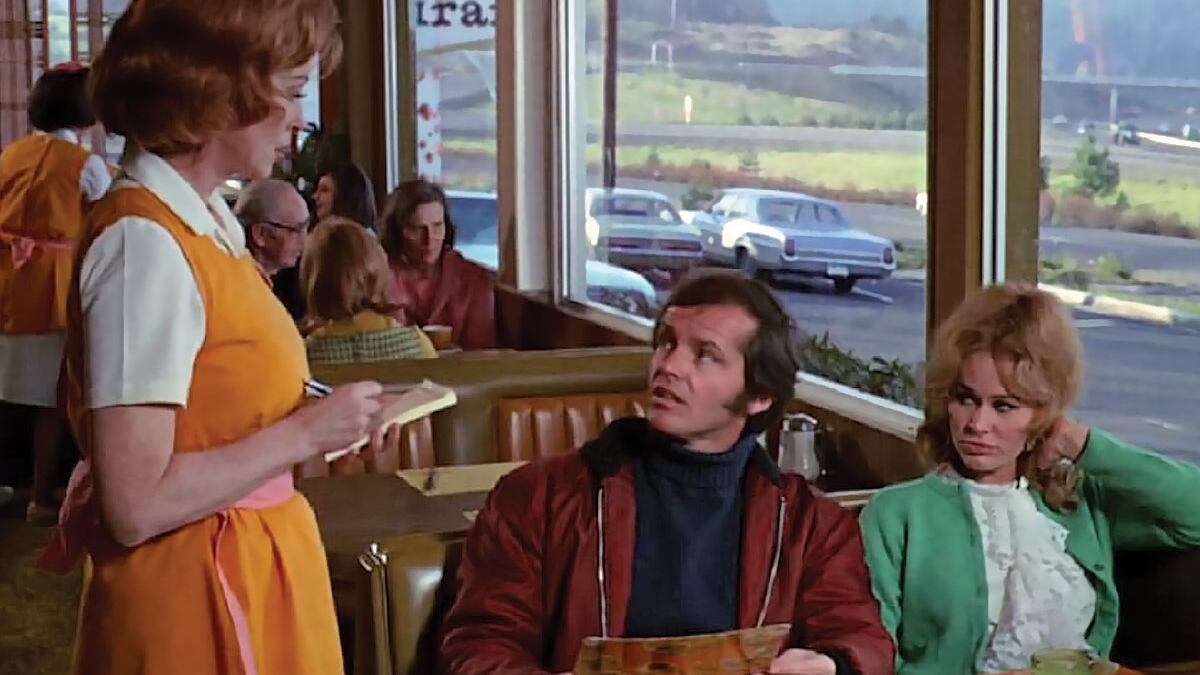A decade before "Heeeeere's Johnny!" and two before "You can't handle the truth!" Jack Nicholson sat in a highway diner in Eugene (a Denny's that's still standing) and teed up his first iconic movie conniption. It was on account of some toast.
This standout scene from Five Easy Pieces (1970) was confirmation of Nicholson's new stardom—squirrely, venomous and cutting edge. With neither matinee looks nor polish, he sneered his way through an argument over menu substitutions, eventually ordering a chicken salad sandwich, hold everything but the browned bread. The server can't abide his snarky gambit for toast, so he clears the table with his forearm and storms out.
That boiling point helped usher in a new era of cinema, making it the perfect movie to revisit right now. Not only was a portion of Five Easy Pieces shot in our own backyard, it happens to be turning 50 years old, and you are likely relate to Nicholson's malaise building into rage while sheltering at home during a pandemic. The acclaimed Bob Rafelson drama typifies '70s New Hollywood, with its roving character study, small-budget, patient camerawork and rejection of what passed for American values and storytelling.
Nicholson simmers in the role of Bobby Dupea, a Central California oil rigger whose blue-collar pattern of working, bowling and traipsing home to his girlfriend (Karen Black) doesn't quell his anger. After losing the job, he travels north to the San Juan Islands of Washington to visit his ailing father. Though only the middle section of this journey is set in Oregon, the film as a whole resembles a drifter's journey along I-5: Bobby can't hold down a job, commit to a relationship or remain sober for too long because, as he puts it, "Things get bad if I stay."
While Five Easy Pieces is vastly superior, another Oregon-shot 1970 film, Getting Straight, is perhaps a clearer artifact from a half-century ago. Through the perspective of a failing grad student (Elliott Gould, fresh off M*A*S*H), Getting Straight touches a countercultural pulse that's verging on arrhythmia. The Vietnam War, the sexual revolution and a whole slew of liberation movements were cresting, and in turn, the film's best sequences are of a student body violently clashing with the National Guard (filmed at Eugene's Lane Community College). These visceral, frenzied scenes later proved their relevance through tragedy, hitting theaters just one week after the Kent State shootings of May 1970.
If both films lend a big-screen rebel shine to Oregon, they also borrow the freedom of the setting. In Five Easy Pieces, Oregon represents catharsis, a vagabond's playground away from the tainted Rockwellian fantasy of the Central Valley. In Getting Straight, Oregon takes on another of its well-known dimensions as a left-wing petri dish. The jaded Harry Bailey (Gould) has attained big-fish status in his unnamed West Coast college town. It's no Berkeley, he says, but the grassroots enclave has aspirations to take the national protest stage.
Of course, these films also make good (or bad, as it were) on another New Hollywood trope: giving their white male antiheroes endless leeway to abuse romantic partners, misuse privilege and wallow in their anger. Perhaps Bobby and Harry's most damning shared trait is their constantly falling into bed with women they've just finished harassing. Through 2020 eyes, there's an undeniable and maybe unforgivable romance to their terrible behavior, and even New Hollywood's most important critic, Pauline Kael, described the Five Easy Pieces protagonist as "so defeated [he's] morally superior."
More resounding than whether these 1970 films "hold up" is the track they laid. Five Easy Pieces helped cement the morally complex loner-against-society paradigm. You can see its likeness in Taxi Driver (1976), My Own Private Idaho (1991), Thelma and Louise (1991) and even Joker (2019). While Getting Straight didn't have quite as much influence on future projects, its powder keg storyline and latently idealistic POV character are improved a hundredfold by Spike Lee in both School Daze and Do the Right Thing.
"A man who can't believe in a cause could never believe in himself," Candice Bergen's Jan chides Harry in Getting Straight. It's one of the few proper rebuttals to the central man in either film, and 50 years later, her accusation provides a balanced lens to reappraise these slices of film history. We don't have to believe in these men, but we can sense their quandary.
SEE IT: Five Easy Pieces streams on Amazon Prime, Crackle, Google Play, iTunes, Vudu and YouTube. Getting Straight streams on Amazon Prime, Google Play, iTunes, Vudu and YouTube.
